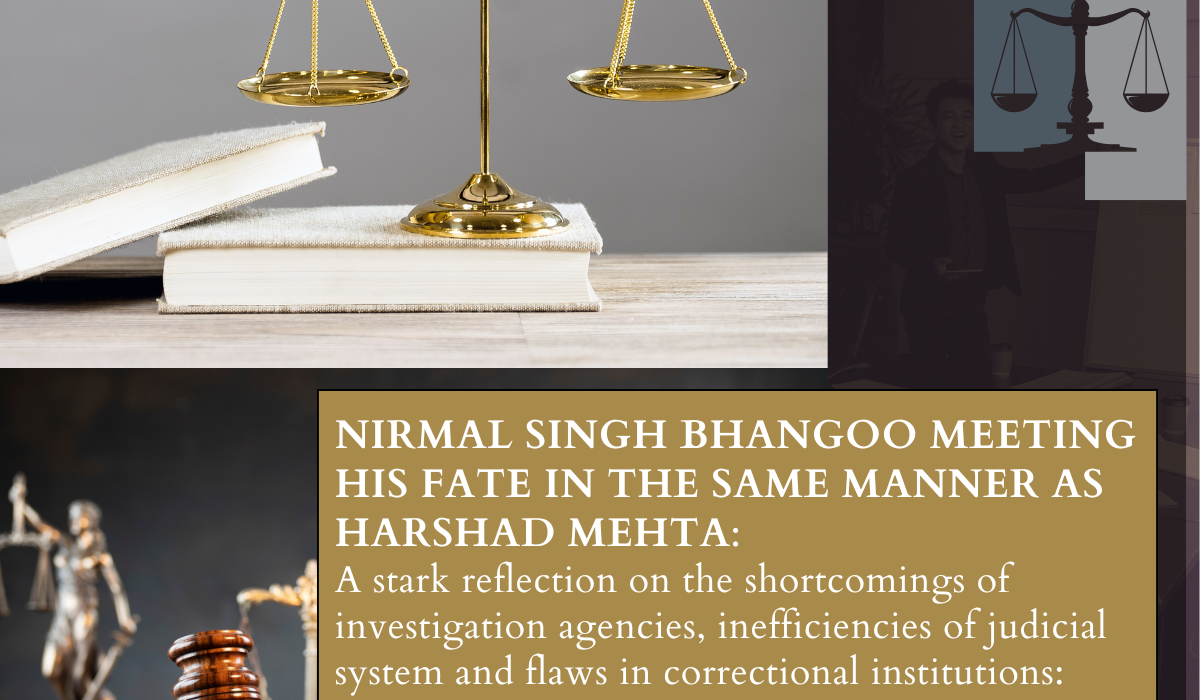NIRMAL SINGH BHANGOO MEETING HIS FATE IN THE SAME MANNER AS HARSHAD MEHTA: A stark reflection on the shortcomings of investigation agencies, inefficiencies of judicial system and flaws in correctional institutions:
The tragic saga of Nirmal Singh Bhangoo, who met his end under circumstances eerily reminiscent to the infamous Harshad Mehta, brings to light profound issues persistent in investigation agencies, judicial systemand correctional institutions. Bhangoo’s demise serves as a grim reminder of the persistent inefficiencies and systemic flaws.
The Bhangoo-Mehta Parallels
Nirmal Singh Bhangoo, a name that may not resonate with the same level of notoriety as Harshad Mehta, shared a fate strikingly similar to the notorious stockbroker whose 1992 financial scam shook the foundations of India’s financial and legal systems. Both individuals, though products of different eras and contexts, found themselves ensnared in a web of systemic failure that highlights ongoing issues in accountability, transparency, and justice.
Nirmal Singh Bhangoo, the founder of PACL and PGF, was a prominent figure in India’s financial sector during the 1990s and early 2000s. Originally a milkman from Punjab, Bhangoo eventually ventured into the finance and real estate sectors, establishing a reputation as a successful businessman. His ventures were primarily based on a model that promised high returns on investments in agricultural land and real estate. Both PACL and PGF marketed their schemes aggressively, and as promised delivered investors substantial returns on their investments. These schemes were attractive to many, especially in a financial landscape where high returns were rare, as a result of which 6.5 Crore people invested approximately Rs. 50,000 Crores in the schemes run by PACL and PGF.
In the early 2010s, SEBI halted the operations of these companies as they were not registered under the collective investment scheme regulation. The matter went to the Apex Court, wherein to the utter astonishment of the management of the companies, in a simple case of alleged regulatory non-compliance,CBI investigation was launchedand a committee was constituted under the chairmanship of a former Chief Justice of India, to dispose the land/properties purchased by the companies and effectuate refund of monies to the investors.
Shortcomings of investigation agencies
India’s top notch investigation agencies, such as CBIand ED, are often seen as the vanguards of integrity and diligence. However, Bhangoo’s story underscores a different reality: one of inefficiency and, at times, questionable effectiveness.Despite having substantial resources and advanced investigative tools, these agencies are frequently criticized for their slow pace and lack of thoroughness.Bhangoo’scase,illustrates how investigative processes can be marred by delays, lack of coordination, and sometimes even a lack of will to pursue justice vigorously.The convoluted bureaucracy, frequent changes in investigative personnel, and the politicization of high-profile cases further complicate the matter.
Even though FIR was registered by CBI in the year 2014, in compliance of the order of the Apex Court, the preliminary charge sheet wasfiled after 2 years in the year 2016, and thereafter the supplementary chargesheet was filed after 5 more years in the year 2021, wherein exactly same penal provisions were pressed against the companies and all its office bearers, without even taking into account the test of corporate criminality.
Regardless of the main CBI case, numerous subsequent FIRs have beenregistered against various office bearers of the companies, on the basis of exact same cause of action, implicating many of them in multifarious criminal prosecutions spread across the length and breadth of the country. The registration of subsequent FIRs on the exact same cause of action is legally untenable as State Police cannot intervene when CBI has already assumed the jurisdiction in a matter.
Inefficiencies of judicial system
The Indian judicial system, while constitutionally strong and revered for its role in upholding the rule of law, often grapples with significant inefficiencies. The protracted delays in the legal process are a primary concern. Court cases drag on for years, sometimes decades, which can be detrimental to both the accused and the victims.
In Bhangoo’s case, the sluggishness of judicial proceedings meant that justice was delayed, and in many instances, denied.Firstly, even after filing of preliminary chargesheet in the year 2016 and filing of supplementary charge sheet in the year 2021, the main CBI case has not even reached the stage of trial as the Ld. Judge, who had already heard arguments on charge had been transferred abruptly, due to which the matter has been thrown back to square one. Secondly, even though Bail is a rule and Jail is an exception, Applicants were not granted Bail even on the most serious medical grounds, regardless of the fact that another office bearer of these companies (Kanwaljeet Singh Toor) has already died while in custody. Thirdly, the remedy of consolidation of multiple FIRs and quashing of subsequent FIRs on the same cause of action, although sought for multiple persons, was never granted. Fourthly, the Committee constituted by the Apex Court, even after taking substantial time of 8 long years has neither been able to effectuate refunds to all the investors, nor been able to sell all the land/properties of the companies.
The inability of the Indian judicial system to deliver justice timelyundermines public confidence and exacerbates the feeling of impunity among wrongdoers.The backlog of cases is staggering, and despite various reforms and the introduction of fast-track courts, the system remains overwhelmed. This not only affects high-profile cases but also impacts the average citizen seeking redressal.
Flaws in correctional institutions
The state of correctional institutions in India is another area of grave concern. Prisons are often overcrowded, under-resourced, and plagued by poor conditions. The lack of effective rehabilitation programs and the overall neglect of inmate welfare contribute to a correctional system that fails to reform and reintegrate individuals successfully.
Nirmal Singh Bhangoo’s demise in custody, highlights the dire need for reform in these institutions. The conditions under which inmates are held can often exacerbate mental and physical health issues, leading to tragic outcomes. The failure to address these issues reflects a broader problem within the correctional system; one that requires urgent and comprehensive reform.
The way forward
Addressing these systemic issues requires a multi-faceted approach. Investigation agencies need to adopt more efficient practices, improve coordination, and ensure transparency to restore public trust. For the judicial system, enhancing case management systems, increasing the number of judges, and streamlining procedures can help reduce delays. Reforming correctional institutions to focus on humane conditions and effective rehabilitation is also crucial.
The fate of Nirmal Singh Bhangoo, echoing the unresolved issues, calls for introspection and affirmative action. It is a stark reminder that the quest for justice in India remains fraught with challenges that need to be addressed comprehensively. If Nirav Modi and Vijay Malayaare absconding the territory of the country to evade prosecutions, whereas Harshad Mehta and Nirmal SinghjBhangooare dying in custody awaiting trial, then there is certainly something wrong that needs rectification. Only by confronting these inefficiencies head-on can the Indian legal and correctional systems hope to achieve the fairness and efficacy that citizens rightfully expect.
Authored by:
Adv. Somesh Pandey



